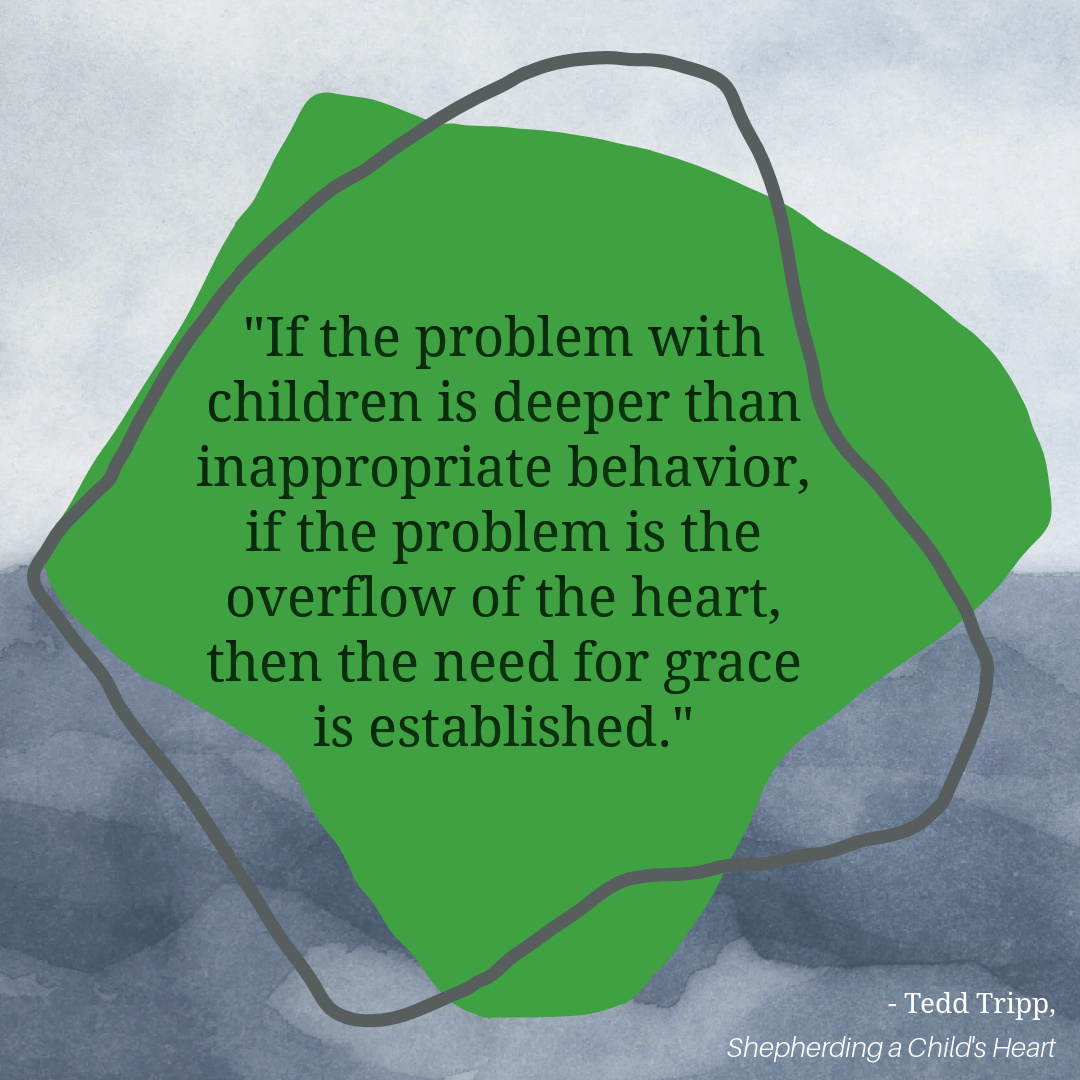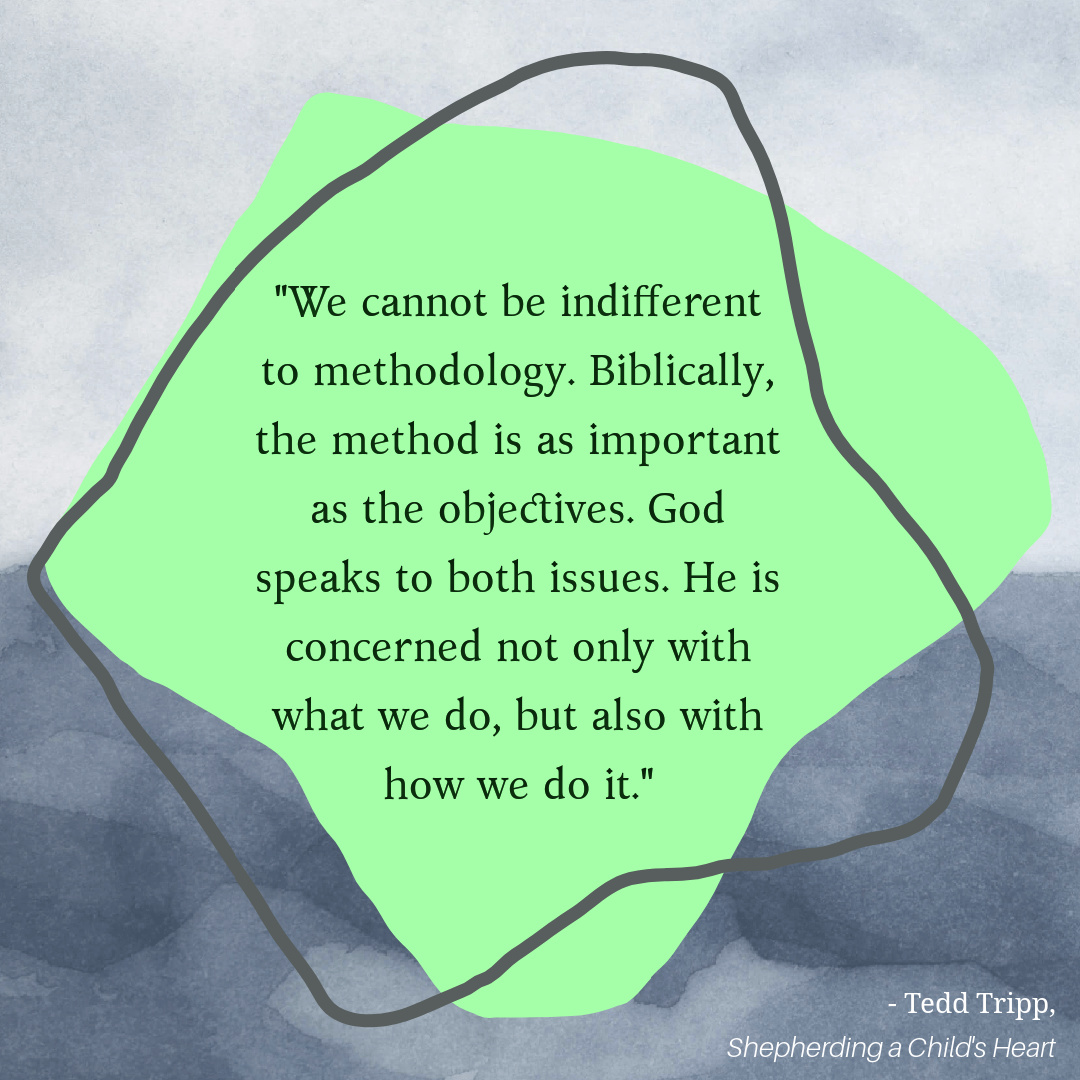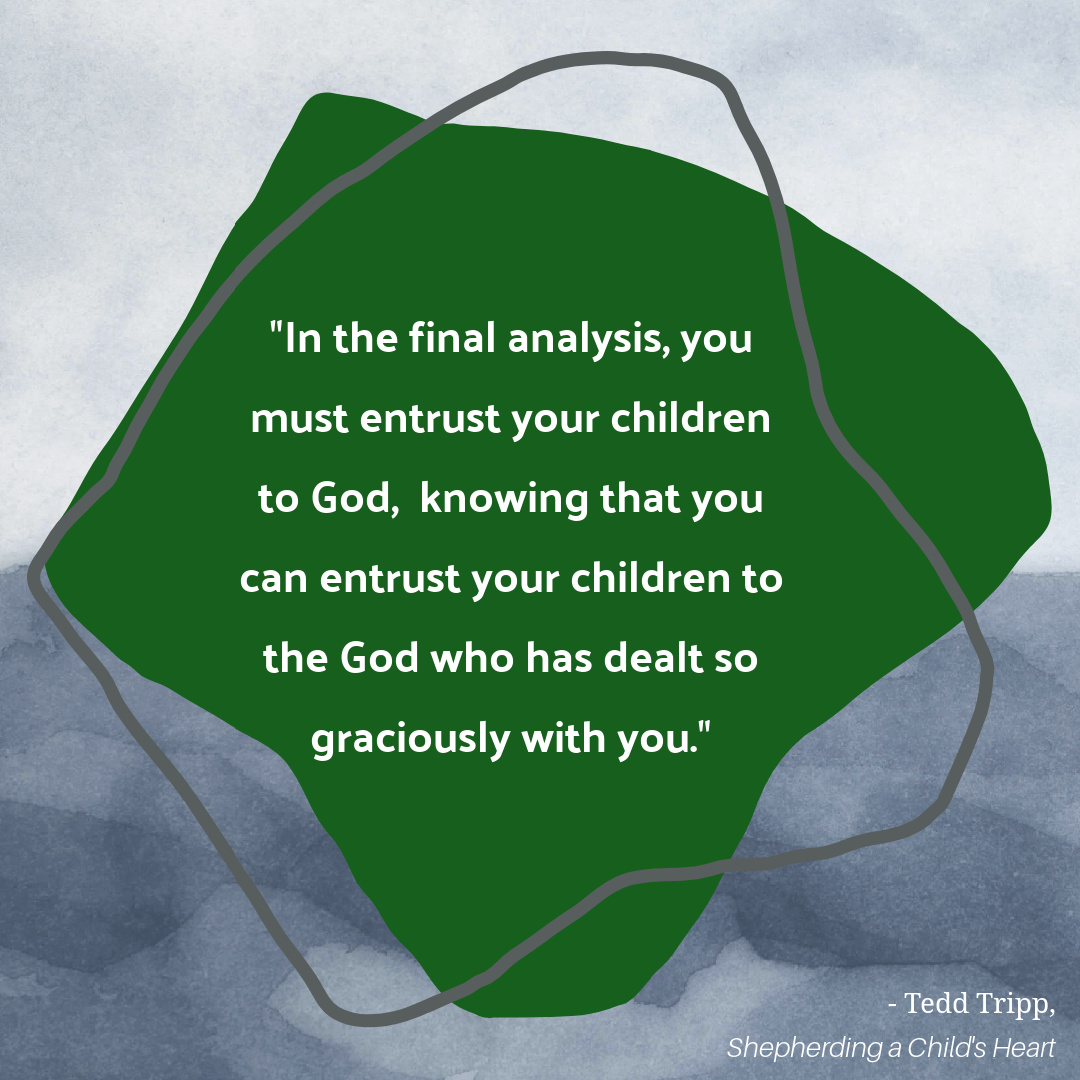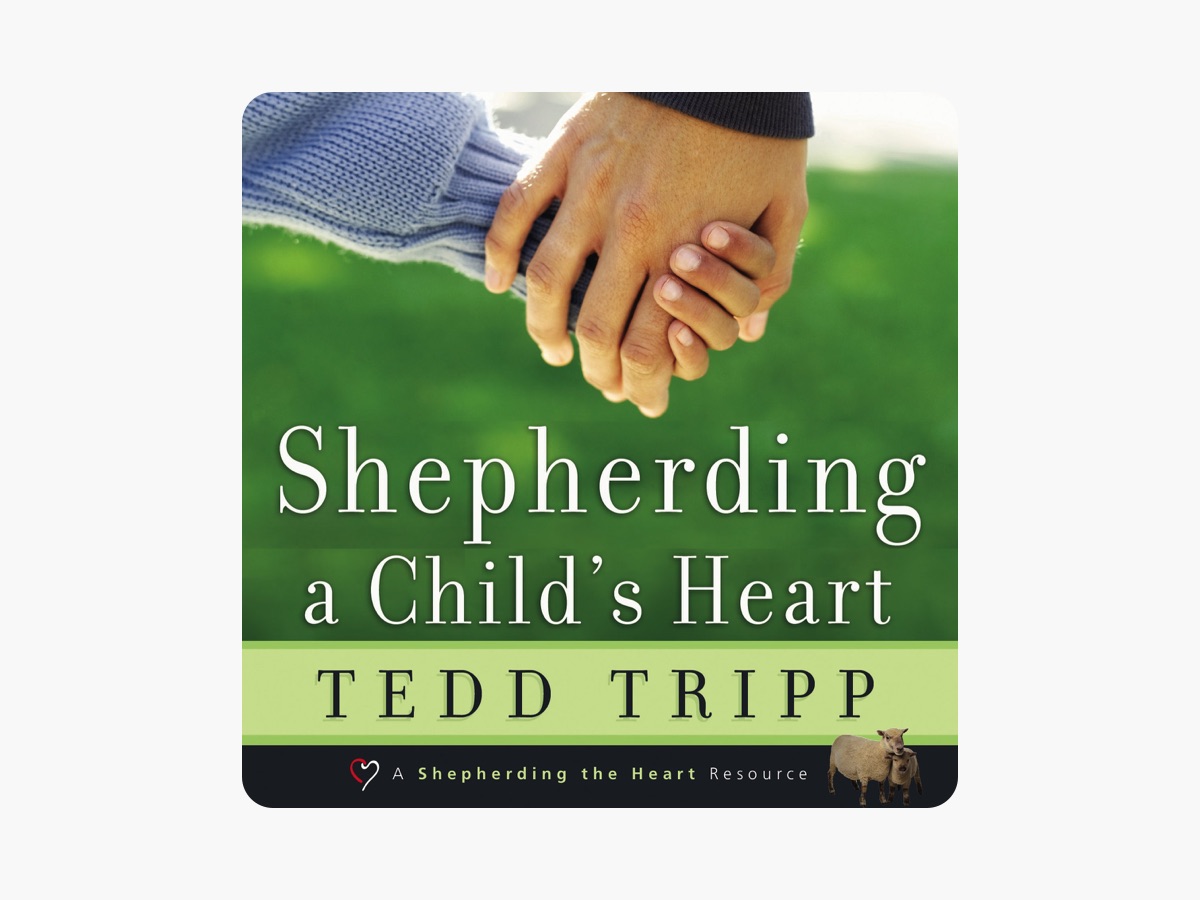One way I am embracing my Word for the year (Shepherd) is by reading a Word-related book each season. The goal is to read at least two books this year related to following the Shepherd and two books on being a shepherd to my kids. My winter book offered an in-depth look at Psalm 23 from the perspective of a real-life shepherd (you can read that review here), and this spring I read a book from pastor Tedd Tripp that approaches child-rearing from a biblical perspective, focusing first and foremost on the child’s heart as we shepherd our kids.

It can be easy for parents to become so preoccupied with our children’s external behavior that we neglect what’s going on inside. As Tedd Tripp points out in his preface to the book’s second edition, “we tend to worry more about the ‘what’ of behavior than the ‘why’. Accordingly, most of us spend an enormous amount of energy in controlling and constraining behavior. To the degree and extent to which our focus is on behavior, we miss the heart.” But Scripture tells us that God is MOST concerned with the heart, which is the wellspring of life (Proverbs 4:23); if it’s the heart that matters most to God, perhaps it should matter most to us, too. When we miss the heart, we miss out on opportunities for instilling the truth of the Gospel in our kids, and we miss out on a chance to point them to the glory of God. But what does it look like to parent our kids from the inside out? That is the question that Shepherding the Child’s Heart attempts to answer.
The book begins by casting a biblical vision for the parenting task, which involves “being a kind authority, shepherding [our] children to understand themselves in God’s world, and keeping the gospel in clear view so [our] children can internalize the good news and someday live in mutuality with [us] as people under God.” Tripp emphasizes that God calls his creatures to live under authority, and that as parents we have been given authority over our children—”not to hold them under [our] power, but to empower them to be self-controlled people living freely under the authority of God.” This wisdom goes against prevailing secular advice that tends to villainize authority structures of any type (including authority of parents over their children), and I appreciated this call back to the healthy biblical model of family that establishes parents as loving, intentional shepherds of our children.
Following this introduction that reorients readers toward the purpose of our parenting, the book consists of two parts. In Part One, Tripp establishes the foundations of biblical childrearing, from getting to the heart of the behavior to embracing specific methods (communication, discipline, and appeal to conscience). In Part Two, Tripp walks his audience through the various stages of parenting (infancy, childhood, and teenagers), outlining the training objectives for each stage and then getting into exact procedures for meeting those objectives.

I won’t go into every detail of the book here, but I did take detailed notes during my reading and would like to share some core takeaways.
+ As parents, we cannot let aberrant behavior go unchecked. But “a change in behavior that does not stem from a change in heart is not commendable; it is condemnable.” In addition to correcting behavior, we must ask questions that expose the heart attitude that led to the poor behavior. And to do this, we “must learn to engage them, not just reprove them. Help them see the ways that they are trying to slake their souls’ thirst with that which cannot satisfy.”
+ Children are a product of life experience AND how they interact with that experience. Shaping experiences are neither entirely deterministic (we are not helpless victims of our circumstances) nor are they inconsequential. As parents, we must be intentional about the influences (in and out of the house) that are shaping our kids while also recognizing that children themselves are ultimately responsible for the way they respond to our parenting. Children will respond constructively to our shaping efforts if they know and love God.
+ Discipline is not about me and my agenda. It is me “coming as God’s representative, bringing the reproofs of life” to my kids. Discipline is to be corrective, not punitive, and it is to be an expression of love.
+ It is easy to have good goals of parenting that are not biblical. My chief goal as a parent is to teach my kids to glorify God and enjoy him forever. All other goals (good behavior, quality education, developing special skills, psychological adjustment, etc.) are inconsequential.
+ Most parenting methods (behavior modification, emotionalism, punitive correction) have one thing in common: the human mind is the standard. A biblical approach to parenting involves two elements working together: rich, full communication (dialogue focused on understanding) and the rod.
—> Types of Biblical communication include encouragement, correction, rebuke, entreaty, instruction, warning, teaching, and prayer.
—> “The use of the rod [physical punishment] signifies a faithful parent recognizing his child’s dangerous state and employing a God-given remedy. The issue is not a parental insistence on being obeyed. The issue is the child’s need to be rescued from death—the death that results from rebellion left unchallenged in the heart.”
+ The central focus of correction should be on redemption, “bringing children to a sober assessment of themselves as sinners. They must understand the mercy of God, who offered Christ as a sacrifice for sinners. How is that accomplished? [We] must address the heart as the fountain of behavior, and the conscience as the God-given judge of right and wrong.”

+ The most important lesson for a young child to learn is that “HE IS AN INDIVIDUAL UNDER AUTHORITY. He has been made by God and has a responsibility to obey God in all things.” I need to teach my children how live within the circle of submission to authority, obeying consistently without challenge, excuse, or delay.
+ The big issue during the middle years of childhood is character. We want children of this age “to learn dependability, honesty, kindness, consideration, helpfulness, diligence, loyalty, humility, self-control, moral purity, and a host of other character qualities.” I must be willing to hold my children accountable to the process of character refinement.
+ The primary goal during the teenage years is to teach the three foundations of life as laid out in Proverbs 1:7-19: the fear of the Lord, adherence to parental instruction, and disassociation from the wicked. These goals are achieved through the internalization of the Gospel.
+ Tripp’s final words of wisdom: “you must entrust your children to God. How they turn out will depend on more than what you have done in providing shaping influences. It will depend on the nature of their Godward commitment. Ultimately, you leave them to God, knowing that you can entrust your children to the God who has dealt so graciously with you.”
I greatly appreciate Ted Tripp’s heart-focused approach to parenting, and I value his insight. I struggled with some of the book’s aspirational ideas around parenting and with many strategies that seem better suited to families with just one or two children; the level of intentionality described in some sections just doesn’t seem feasible for a larger family and the various sibling interactions that can complicate basic parenting practices. I also found some of the language and ideas to be somewhat dated (this was first published in 1995, and even the updated versions felt out of sync with contemporary culture), and the storytelling is pretty stilted. But God’s wisdom is timeless, and the premise of this book is sound. I came away from reading feeling better informed and equipped to embrace the role of shepherd in my kids’ lives, as well as more grateful than ever for my own Shepherd who is walking with me as I raise up children who also know how to recognize and heed His calling.


